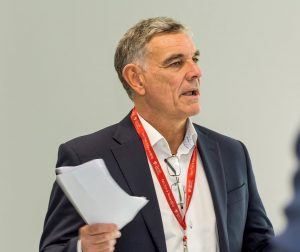Organic growth? The Life Sciences sector

Life sciences has long been a specialism of the Midlands and it has clusters and companies that are internationally innovative.
So what is needed to further increase the impact of this sector and what lessons can other sectors learn from its success?
To answer this, Invest Midlands staged a panel discussion sponsored by the University of Birmingham and chaired by TheBusinessDesk.com’s Midlands editor Sam Metcalf.
On the panel were Dr Nik Kotecha, founder and chairman of Morningside Pharmaceuticals, Dr Tom Burr, chief scientific officer at SourceBio International, Ralph Weir, CEO at Zayndu, Jane Theaker, CEO at PBD Biotech and Professor Gino Martini, managing director at University of Birmingham and Birmingham Health Partner’s Precision Health Technology Accelerator.
Kotecha pointed out that Life Sciences alone boasted a turnover of £9.5bn in 2019 in the Midlands.
“We have seven schools of medicine here in the Midlands and 21 science and innovation parks,” he added. “And we have phenomenal clinical trial capabilities here in the Midlands.”
He said the country had not been ready for the Covid-19 pandemic, but that this region has the expertise and resources to make sure the UK is prepared for the next pandemic – whenever it strikes.
“The Covid vaccine that would normally take 15 to 20 years was done in nine months, which shows the importance of collaboration and significant funding from Government,” he said.
Martini said the Life Sciences sector in the Midlands had demonstrated how quickly it could react to a crisis, noting that one of his own colleagues had devised a nasal spray for Covid in just nine months.
“This is now being launched in the Far East – so where there’s a collective will we can achieve a lot,” he said.
Commenting on ongoing work with Bruntwood SciTech, he said: “They are co-developing the Birmingham Health Innovation Campus (BHIC) with us,”
“We’re creating a huge, flexible collaboration space and there will be laboratories and offices – an adaptable eco-system to allow start-ups to grow. There will also be a training facility.”
Burr said his company had scaled rapidly over the last two years, though much of its NHS related work halted during the pandemic when non-essential surgeries were suspended.
“We switched towards supporting the UK Government with its Covid screening programme,” he said. “We were able to tap into local expertise to build an infectious disease testing division.
“For us, the pandemic speeded up use of digital technology – particularly with digital pathology.
“This resulted in us acquiring another pathology business which also had digital capability.”
He added he had seen plenty of community spirit in the region during the pandemic, with people and organisations willing to share knowledge and resources.
Theaker said her company had managed to largely continue operating as normal, despite Covid-19.
She said the Midlands region’s large, diverse population makes it an ideal location for clinical trials. “We’ve done some very innovative clinical trials with a team at Leicester University looking at contact tracing for tuberculosis,” she added.
“The Government is putting a lot of cash into R&D in our region, which means we should get more equity investment.”
She also singled out Mercia Asset Management for the money it has provided the Midlands Life Sciences sector.
Responding to a question on whether the region has enough incubation space, Weir said this provision is currently a “mixed bag”.
“Commercial property is not always very accessible, which can be the most difficult challenge for a start-up,” he said.
“The other option is academic innovation centres, but these have to accommodate lots of different specialisms in one building.
“The best experiences of incubation come when there are good social spaces where people can meet and talk informally. Those sorts of conversations are worth their weight in gold.”











